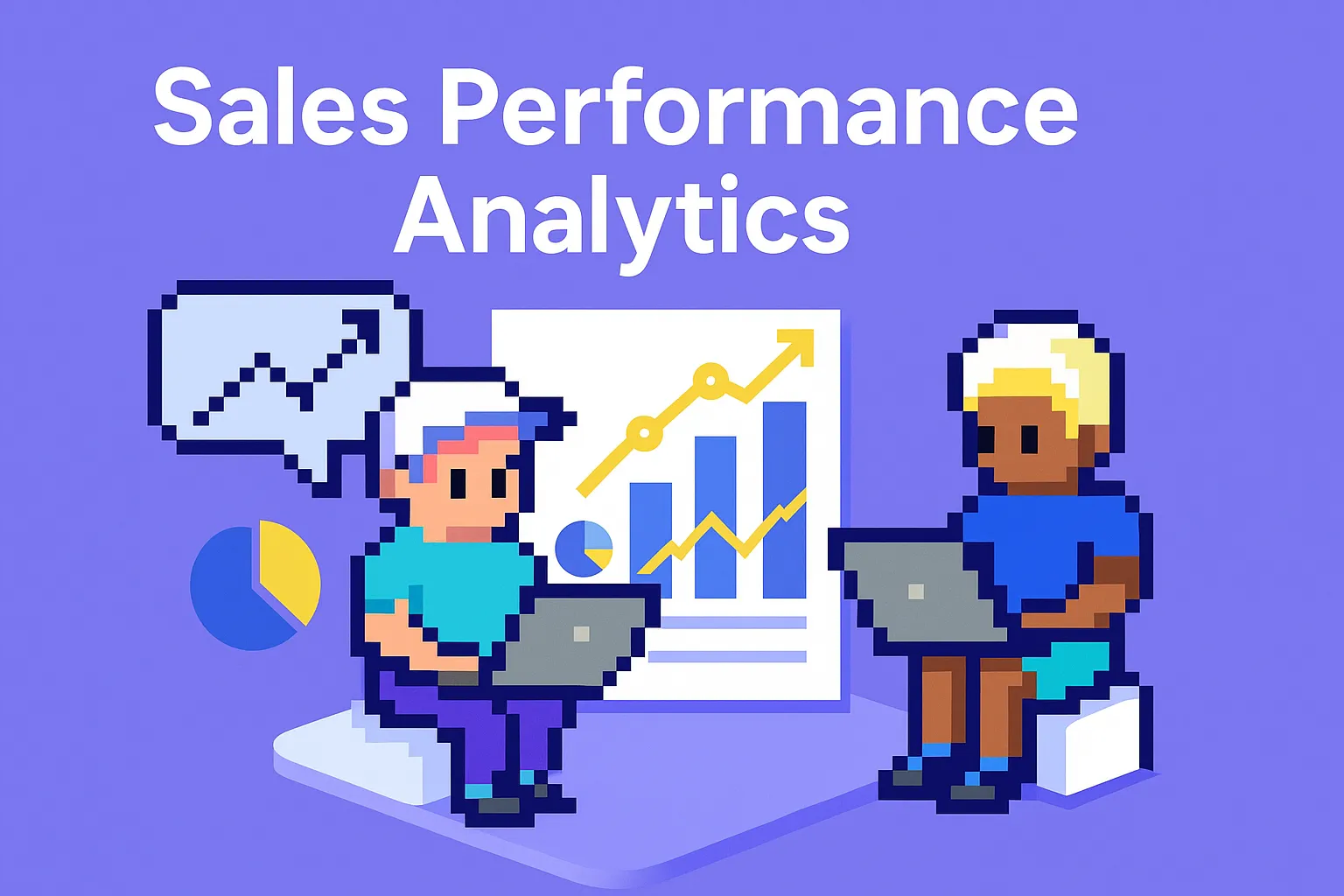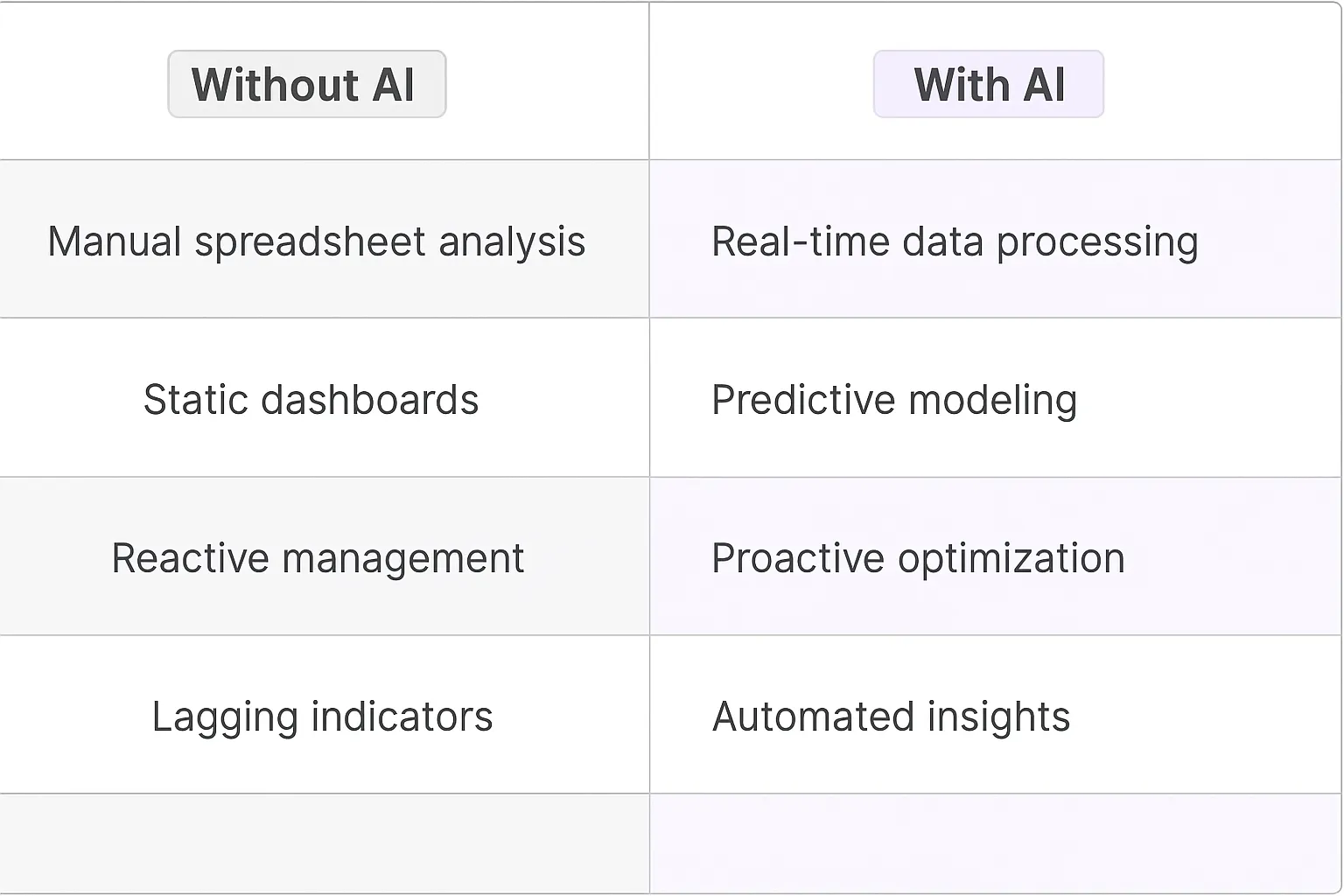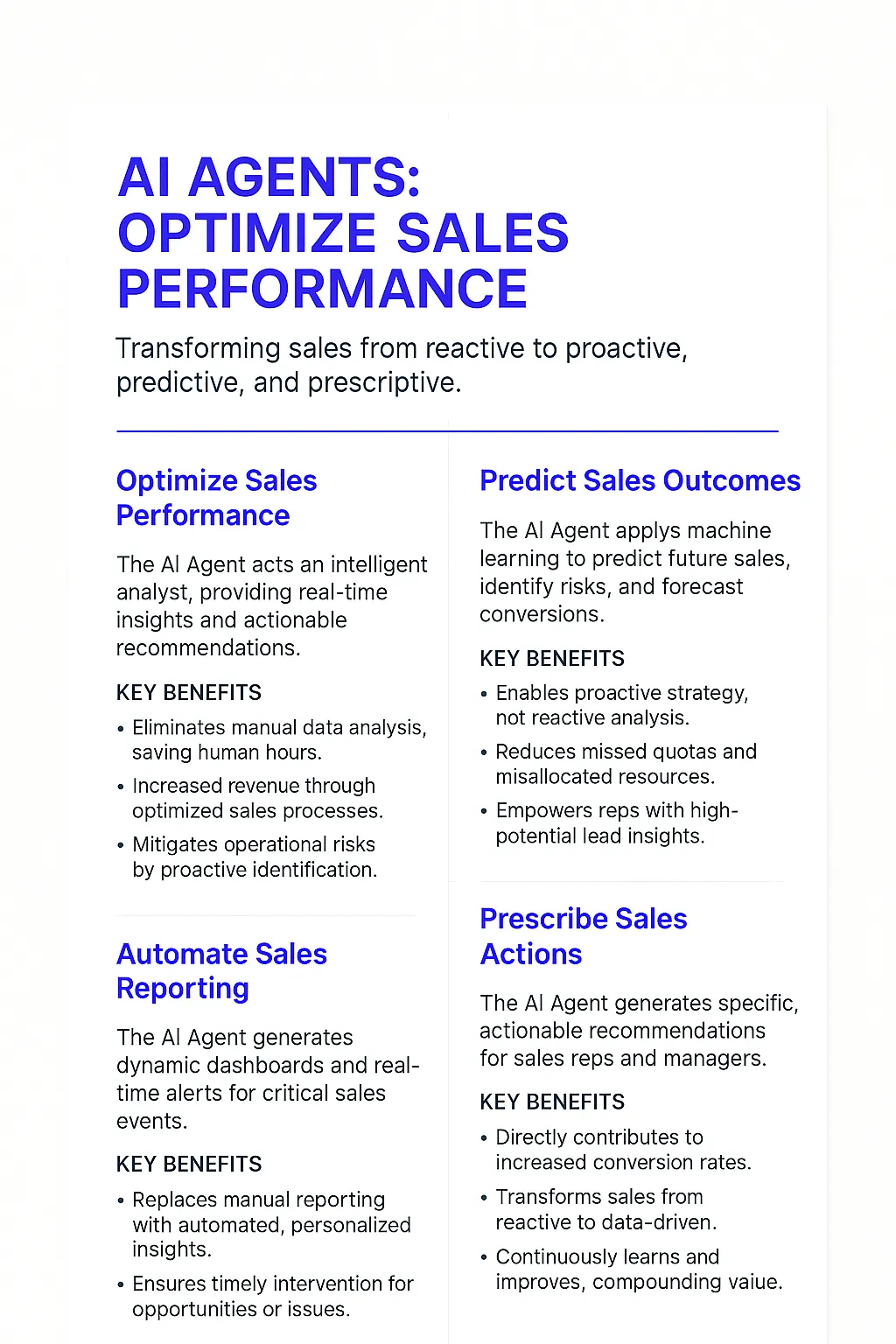Sales Performance Analytics AI Agents
Understanding Sales Performance Analytics and AI Agents
What is Sales Performance Analytics?
Sales Performance Analytics is the practice of using data-driven insights to measure, analyze, and optimize sales activities and outcomes. It goes beyond traditional reporting by leveraging advanced analytics techniques to uncover deep insights into sales processes, rep performance, and customer behavior. With the integration of AI agents, Sales Performance Analytics has evolved into a powerful tool that not only tracks historical data but also predicts future trends and prescribes actions to improve sales outcomes.
Key Features of Sales Performance Analytics
- Real-time data processing and analysis
- Predictive modeling for sales forecasting
- AI-driven insights and recommendations
- Automated reporting and dashboards
- Performance benchmarking and goal tracking
- Customer behavior analysis and segmentation
- Pipeline management and optimization
- Integration with CRM and other sales tools

Benefits of AI Agents for Sales Performance Analytics
What would have been used before AI Agents?
Before AI agents entered the scene, sales teams relied on a mishmash of spreadsheets, static dashboards, and gut feelings. They'd spend hours manually crunching numbers, trying to extract meaningful insights from a sea of data. It was like trying to solve a Rubik's Cube blindfolded – possible, but painfully slow and often inaccurate.
Sales managers would huddle around screens, squinting at charts and graphs, hoping to spot trends or anomalies. They'd make decisions based on lagging indicators, often realizing too late that they'd missed crucial signals buried in the noise. It was a world of reactive management, where course corrections came long after the ship had veered off course.
What are the benefits of AI Agents?
Enter AI agents – the digital teammates that are flipping the script on sales performance analytics. These aren't your run-of-the-mill algorithms; they're sophisticated pattern recognizers and predictive powerhouses. They sift through mountains of data at lightning speed, surfacing insights that would take humans weeks to uncover.
One of the killer features of AI agents in this space is their ability to provide real-time, actionable intelligence. They're constantly monitoring sales activities, customer interactions, and market conditions, flagging potential issues before they become full-blown problems. It's like having a team of eagle-eyed analysts working 24/7, never missing a beat.
But here's where it gets really interesting: AI agents don't just crunch numbers – they learn and adapt. They pick up on subtle patterns in successful sales strategies, helping reps replicate winning behaviors. They can predict which leads are most likely to convert, allowing teams to focus their energy where it matters most. It's not just about working harder; it's about working smarter.
Perhaps the most transformative aspect is how AI agents democratize data insights. They can translate complex analytics into plain English, making high-level strategic information accessible to everyone on the team. This creates a data-driven culture where decisions are made based on evidence, not hunches.
The bottom line? AI agents are turning sales performance analytics from a rear-view mirror into a crystal ball. They're not just helping teams hit their numbers; they're fundamentally changing how sales organizations operate, learn, and grow. In a world where the difference between winning and losing often comes down to milliseconds and microtrends, AI agents are becoming the secret weapon of high-performing sales teams.

Potential Use Cases of AI Agents with Sales Performance Analytics
Processes
Sales performance analytics is ripe for AI-driven transformation. These digital teammates can dive deep into the data, surfacing insights that even the most seasoned sales managers might miss. They're not just crunching numbers; they're uncovering the story behind the data.
One key process where AI agents shine is in pipeline management. They can analyze historical data, current market trends, and individual rep performance to predict which deals are most likely to close. This isn't just about probability percentages; it's about understanding the nuanced factors that influence deal progression and providing actionable recommendations to move the needle.
Another critical process is territory planning and optimization. AI agents can crunch through vast amounts of geographic, demographic, and economic data to suggest optimal territory divisions. They can even factor in individual rep strengths and customer relationships to propose assignments that maximize overall team performance.
Tasks
On a more granular level, AI agents can tackle specific tasks that traditionally eat up a sales manager's time. For instance, they can automatically generate performance reports, not just with raw numbers, but with insightful commentary on trends, anomalies, and areas for improvement.
These digital teammates can also assist in quota setting. By analyzing historical performance, market conditions, and individual rep capabilities, they can suggest realistic yet challenging quotas. This isn't about setting arbitrary numbers; it's about finding that sweet spot that pushes reps to excel without crushing morale.
Another task where AI agents excel is in identifying coaching opportunities. By analyzing call recordings, email exchanges, and deal progression data, they can pinpoint specific areas where each rep could improve. This goes beyond generic advice; it's about providing tailored, actionable feedback that can immediately impact performance.
The real power of AI in sales performance analytics isn't just in automating tasks or crunching numbers faster. It's in the ability to uncover non-obvious insights, predict future outcomes, and provide strategic recommendations that can fundamentally change how sales teams operate. We're moving from reactive management based on lagging indicators to proactive optimization based on leading indicators and predictive analytics.
As these AI agents become more sophisticated, we'll likely see a shift in the role of sales managers. They'll spend less time on routine analysis and more time on high-level strategy and personal coaching. The AI isn't replacing the human touch in sales management; it's amplifying it, allowing managers to focus on the areas where their experience and intuition add the most value.
The companies that figure out how to effectively integrate these AI agents into their sales processes will have a significant competitive advantage. They'll be able to make faster, more informed decisions, optimize their resources more effectively, and ultimately drive better results. The future of sales performance analytics isn't just about having more data; it's about having AI-powered insights that drive action and results.

Industry Use Cases: AI Agents Transforming Sales Performance Analytics
AI agents are reshaping the landscape of sales performance analytics, offering game-changing capabilities across diverse industries. These digital teammates aren't just crunching numbers; they're providing actionable insights that can make or break a company's bottom line. Let's dive into some industry-specific scenarios where AI agents are proving their worth in sales analytics:
In retail, AI agents are dissecting customer behavior analysis patterns at a granular level, helping sales teams anticipate trends and personalize their approach. For B2B tech companies, these agents are sifting through vast datasets to identify high-value prospects and predict churn with uncanny accuracy. In the pharmaceutical sector, AI is revolutionizing territory management, optimizing sales rep routes based on real-time data and historical performance metrics.
These use cases aren't just theoretical - they're happening right now, transforming how companies approach sales forecasting and execution. The impact is real, and it's substantial. As we explore these scenarios, you'll see how AI agents are becoming indispensable partners in driving sales performance to new heights.
Real Estate: Unlocking Hidden Value with AI-Powered Sales Analytics
The real estate industry is ripe for disruption, and AI-powered sales performance analytics are the secret weapon savvy firms are using to crush their competition. Let's dive into how these digital teammates are transforming the game.
First off, these AI agents are like having a team of data scientists working 24/7 to uncover patterns in your sales data. They're sifting through mountains of information - property details, market trends, client interactions, and closing rates - to surface insights that would take humans weeks or months to discover.
Here's where it gets interesting: these AI agents don't just crunch numbers; they're predicting future market trends with uncanny accuracy. Imagine knowing which neighborhoods are about to boom before anyone else. That's the kind of edge these digital teammates provide.
But it doesn't stop there. These AI agents are also personalizing the sales approach for each client. They're analyzing past interactions, preferences, and behavior to suggest the perfect properties and optimal communication strategies for each prospect. It's like having a mind-reading assistant for every agent.
The real kicker? These AI agents are continuously learning and improving. Every transaction, every client interaction, every market shift - it all feeds back into the system, making predictions more accurate and strategies more effective over time.
Real estate firms leveraging these AI-powered sales performance analytics are seeing their close rates skyrocket and their market share expand. They're not just selling properties; they're building predictive empires that leave traditional firms in the dust.
This isn't just a tool; it's a fundamental shift in how real estate business is done. Firms that don't adapt risk becoming obsolete. The future of real estate belongs to those who harness the power of AI-driven sales analytics. Are you ready to join the revolution?
Retail: AI-Driven Sales Analytics Reshaping the Shopping Experience
The retail industry is undergoing a seismic shift, and AI-powered sales performance analytics are at the epicenter. These digital teammates are transforming how retailers understand, predict, and influence consumer behavior at an unprecedented scale.
Let's break it down. These AI agents are ingesting vast amounts of data from multiple touchpoints - in-store sensors, online browsing patterns, purchase history, social media interactions, and even weather data. They're not just processing this information; they're uncovering complex correlations that human analysts might never spot.
What's truly game-changing is how these AI agents are enabling hyper-personalization at scale. They're creating individual consumer profiles that go beyond basic demographics, diving deep into behavioral patterns and preferences. This allows retailers to tailor product recommendations, pricing strategies, and marketing messages on a one-to-one basis, in real-time.
But here's where it gets really interesting: these AI agents are predicting inventory needs with pinpoint accuracy. They're analyzing historical sales data, current trends, and even upcoming events to forecast demand. This isn't just about avoiding stockouts; it's about optimizing inventory levels to maximize profitability across thousands of SKUs.
The impact on the in-store experience is profound. These AI agents are powering dynamic pricing models that adjust in real-time based on demand, competitor pricing, and even individual customer willingness to pay. They're also optimizing store layouts and product placements based on customer segmentation and purchase patterns.
For e-commerce, these digital teammates are revolutionizing the entire customer journey. They're personalizing search results, optimizing product descriptions, and even predicting and preemptively addressing customer service issues.
The retailers leveraging these AI-powered sales analytics are seeing dramatic improvements in key metrics - higher conversion rates, increased average order value, and significantly improved customer lifetime value. They're not just selling products; they're creating highly personalized shopping experiences that keep customers coming back.
This isn't a nice-to-have technology; it's becoming a fundamental requirement for survival in the retail space. The retailers who fail to adopt these AI-driven strategies risk becoming irrelevant in an increasingly data-driven market.
The future of retail belongs to those who can harness the power of AI to understand and predict consumer behavior at an individual level. It's not just about big data anymore; it's about big insights and even bigger actions. The question isn't whether to adopt these technologies, but how quickly you can integrate them into your business model.
Considerations
Technical Challenges
Implementing a Sales Performance Analytics AI Agent isn't a walk in the park. It's more like trying to teach a robot to dance salsa while juggling flaming torches. The first hurdle? Data integration. Your sales data is probably scattered across more platforms than there are streaming services. CRM, email, calendars, social media – it's a digital jungle out there.
Then there's the AI model itself. You can't just slap a generic model on your sales data and expect magic. It needs to understand the nuances of your sales cycle, the quirks of your industry, and the subtle differences between a hot lead and a lukewarm one. Training this model is like teaching a newborn to speak – it takes time, patience, and a lot of trial and error.
Let's not forget about scalability. As your sales team grows, your AI needs to keep up. It's like trying to upgrade a car's engine while it's speeding down the highway. You need an architecture that can handle increasing data volumes and user requests without breaking a sweat.
Operational Challenges
On the operational side, you're dealing with a whole different beast. First up: the human factor. Your sales team might view this AI agent as everything from a miracle worker to a job-stealing demon. Managing these expectations is crucial. You need to position the AI as a digital teammate, not a replacement.
Then there's the learning curve. Your sales reps need to understand how to interact with the AI, interpret its insights, and actually apply them in their day-to-day work. It's like giving them a new superpower – cool, but utterly useless if they don't know how to control it.
Data privacy and security are another can of worms. Your AI will be handling sensitive sales data, customer information, and potentially proprietary strategies. You need to ensure it's locked down tighter than Fort Knox, while still being accessible enough to be useful.
Lastly, there's the ongoing maintenance and improvement. An AI is not a set-it-and-forget-it tool. It needs constant feeding with new data, tweaking of algorithms, and adaptation to changing market conditions. It's like having a high-maintenance pet that eats data and poops insights.
Implementing a Sales Performance Analytics AI Agent is a complex endeavor, but get it right, and you'll have a powerful ally in your quest for sales domination. Just be prepared for a journey that's part rollercoaster, part marathon, and all adventure.
Embracing AI for a New Era of Data-Driven Sales
The integration of AI agents into Sales Performance Analytics marks a paradigm shift in how sales organizations operate. These digital teammates are not just tools; they're catalysts for a new era of data-driven sales strategies. By automating complex analyses, uncovering non-obvious insights, and providing predictive intelligence, AI agents are enabling sales teams to move from reactive to proactive management.
However, the true power of these AI agents lies not in replacing human intuition but in augmenting it. They're freeing up sales managers to focus on high-value activities like strategy development and personalized coaching. As these technologies continue to evolve, we can expect to see even more sophisticated applications that further blur the line between human and machine intelligence in sales.
The companies that successfully integrate AI agents into their sales processes will have a significant competitive edge. They'll be able to make faster, more informed decisions, optimize their resources more effectively, and ultimately drive better results. The future of sales performance analytics isn't just about having more data; it's about having AI-powered insights that drive action and results. As we move forward, the question for sales organizations won't be whether to adopt these technologies, but how quickly they can integrate them to stay ahead in an increasingly AI-driven sales landscape.













